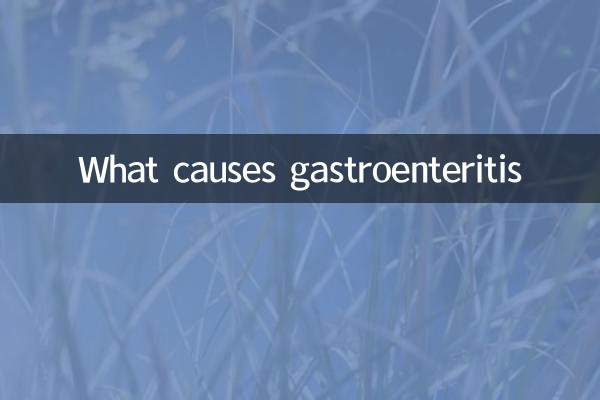What causes gastroenteritis
Gastroenteritis is a common digestive system disease, mainly characterized by symptoms such as abdominal pain, diarrhea, nausea, and vomiting. In recent years, the incidence of gastroenteritis has increased, especially during seasonal changes or irregular diet. This article will analyze the causes of gastroenteritis from multiple perspectives and provide you with comprehensive answers based on hot topics and hot content on the Internet in the past 10 days.
1. Main causes of gastroenteritis

The causes of gastroenteritis are complex and diverse, mainly including infectious and non-infectious factors. The following is a classification of common causes of gastroenteritis:
| Cause type | specific reasons | Common pathogens or triggers |
|---|---|---|
| infectious agents | bacterial infection | Salmonella, E. coli, Shigella, etc. |
| viral infection | Norovirus, rotavirus, adenovirus, etc. | |
| parasitic infection | Amoeba, Giardia, etc. | |
| non-infectious factors | Improper diet | Raw and cold food, spicy food, excessive drinking, etc. |
| drug side effects | Antibiotics, nonsteroidal anti-inflammatory drugs, etc. | |
| stress response | Mental stress, excessive fatigue, etc. |
2. The relationship between recent hot topics and gastroenteritis
According to the hot content analysis of the entire network in the past 10 days, the following topics are closely related to the onset of gastroenteritis:
1.Seasonal influenza and gastroenteritis: Recently, an increase in influenza cases has been reported in many places, and some patients are accompanied by symptoms of gastroenteritis, which may be related to viral mixed infection.
2.food safety incident: A collective food poisoning incident occurred in a certain place. It was detected as salmonella contamination, causing many people to suffer from acute gastroenteritis symptoms.
3.Food hygiene during tourist season: With the arrival of the tourist season, cases of gastroenteritis caused by tourists consuming unclean food or water sources are increasing.
4.Antibiotic abuse problem: Recently, the medical community has once again emphasized that the abuse of antibiotics may lead to an imbalance of intestinal flora and cause drug-induced gastroenteritis.
3. Preventive measures for gastroenteritis
The key to preventing gastroenteritis is to cut off transmission routes and protect susceptible groups. Here are specific prevention recommendations:
| Precautions | Specific content |
|---|---|
| Food hygiene | Wash your hands before meals and after using the toilet, avoid raw food, and heat food thoroughly |
| Water safety | Drink boiled water or sterilized water, avoid drinking raw water directly |
| personal protection | Avoid close contact with patients with gastroenteritis and pay attention to disinfecting tableware |
| Rational use of medication | Avoid overuse of antibiotics and use them under the guidance of a doctor when necessary |
| Enhance immunity | Maintain a regular schedule, exercise appropriately, and supplement with probiotics |
4. Treatment principles of gastroenteritis
Treatment of gastroenteritis should be individualized based on the cause and symptoms. The following are basic treatment principles:
1.fluid therapy: For patients with severe diarrhea and vomiting, water and electrolytes should be replenished in time to prevent dehydration.
2.Cause treatment: Gastroenteritis caused by bacterial infection may require antibiotic treatment, but doctor's advice must be strictly followed.
3.Symptomatic treatment: Antidiarrheal drugs and antiemetics can be used to relieve symptoms, but it is not advisable to use antidiarrheal drugs too early to avoid blocking the excretion of pathogens.
4.diet modification: In the acute stage, you should choose light, easy-to-digest foods and avoid irritating foods.
5.Rest and observe: Ensure adequate rest and closely observe changes in condition. If symptoms worsen, seek medical attention promptly.
5. Special reminder
Recently, clusters of gastroenteritis cases caused by norovirus infection have appeared in many places, and parents are particularly reminded to pay attention to child protection. Norovirus is highly contagious and can be spread through contact. It is recommended to take the following preventive measures:
1. Strengthen hand hygiene and wash hands with soap and running water for at least 20 seconds.
2. Vomitus and excrement must be disinfected in time to avoid the spread of the virus.
3. You should isolate yourself at home during the illness to avoid infecting others.
4. Schools, child care institutions and other collective units should strengthen morning inspections and disinfection work.
Although gastroenteritis is common, recovery can occur quickly if treated correctly. If you or your family members experience symptoms such as persistent high fever, bloody stools, severe dehydration, etc., please seek medical attention immediately to avoid delaying treatment.

check the details

check the details